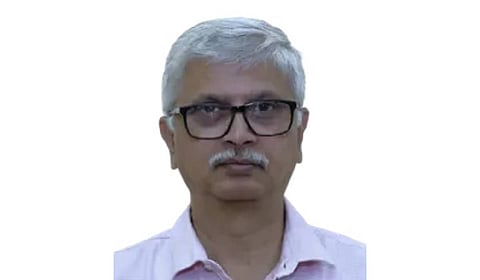

INDORE: Nuclear scientist and Director of Raja Ramanna Centre for Advanced Technology Unmesh D Malshe said in an interview with TNIE, that the expansion of the Kudankulam Nuclear Power Plant will not serve as an alternative to a potential new plant in Kerala. He also said that setting up a nuclear power plant could help address Kerala's power deficit and meet energy demands in neighbouring states. Excerpts from the interview:
Recently, there have been discussions between NPCI and KSEB regarding the possibility of setting up a nuclear power plant in Kerala. Any update on this?
The discussions are ongoing, but nothing has been sanctioned yet. Kerala is exploring the option, which is positive. I believe it's crucial to have as many locations as possible for nuclear plants across states, as this will contribute to the country's overall energy capacity. Currently, India's installed nuclear capacity is around 9 gigawatts, but we aim to reach 21 gigawatts by 2030, so expanding nuclear energy is definitely a priority.
Reports suggest Athirapally and Cheemeni have been identified as potential sites. Can you comment on their feasibility?
If these locations meet the safety criteria set by the Atomic Energy Regulatory Board (AERB), they could be viable. Site selection committees take into account factors like landslide risks and flooding. A site will only be cleared if it meets stringent guidelines, so there's a robust system in place to ensure safety. I can't comment on the specific sites, but I'm sure the committee has considered all the necessary aspects.
There has also been discussion about expanding the Kudankulam Nuclear Power Plant. Could this be a better alternative?
Kudankulam already has plans for six units, each generating 1000 MW, so it's already playing a role in our nuclear capacity. While it's good to expand existing sites, there's no harm in developing more locations across the country. We need to significantly increase our nuclear capacity to meet future energy demands and to contribute to the goal of net-zero emissions. Kudankulam helps, but more plants are needed.
What impact would a nuclear power plant in Kerala have on the state's power generation?
A nuclear power plant in Kerala would meet the state's own energy needs and could potentially supply neighboring states like Tamil Nadu or Andhra Pradesh. Nuclear plants provide baseload power, which is essential for consistent energy supply to both households and industries. With a nuclear plant, Kerala would not only ensure self-sufficiency but also contribute to the regional power grid.
What are the factors to consider when setting up a nuclear power plant in place like Kerala?
The most important factor is access to a reliable water source. Nuclear plants use water for cooling, so proximity to a large water body is ideal. While it's possible to build in landlocked areas using cooling towers, being near water is more efficient. Safety and stability of the site are also crucial, and nuclear plants won't be built in areas prone to earthquakes or other natural disasters.
With an increasing population, how will power demands evolve, and why is nuclear energy important?
By 2070, India's population is expected to exceed 1.5 billion, and power demand will grow exponentially. Currently, our per capita electricity consumption is far lower than in developed nations. To support economic growth and improve the Human Development Index, we need to double our current capacity. Nuclear power plants, being efficient and capable of providing baseload power, are essential to meet these future demands.
Renewable energy sources like solar and wind are being heavily promoted. Why should Kerala still consider nuclear power?
While renewable energy is important, it's intermittent. Solar and wind aren't always available, especially during peak demand at night. Nuclear energy provides a consistent baseload power, which is crucial for industries that require a constant energy supply. Over time, as we phase out coal to meet environmental goals, nuclear energy will play a central role in filling the gap.
Waste disposal is a major concern for nuclear power. How is nuclear waste currently being managed, and is it a risk?
There's a lot of misconception about nuclear waste. Yes, it's hazardous, but when managed properly, it's safe. We follow a closed fuel cycle, where spent fuel is reprocessed and reused, minimising waste. The small amount of waste that's generated is stored in a solid, glassified form in secure facilities. Unlike other countries that adopt an open fuel cycle and dump waste, India is developing long-term solutions, including advanced reactor technologies to reduce waste further.
What about the impact of nuclear plants on local communities, particularly in terms of displacement?
Land displacement is always a concern, but nuclear plants are designed with an exclusion zone for safety, which isn't much larger than that required for coal plants. In many cases, these projects bring economic benefits to local communities through employment and development opportunities. It's important to approach displacement with sensitivity and to ensure that those affected benefit from the project.
Concerns have been raised about the potential impact on marine life. How significant is this issue?
While heat dissipation into nearby water bodies does occur, the impact is generally localized and doesn't extend far beyond the plant. The sea is a vast resource, and the heat released is minimal in comparison to the volume of water. Studies show that this has a limited effect on marine ecosystems, and regulatory bodies ensure that safety standards are met to minimize any potential harm